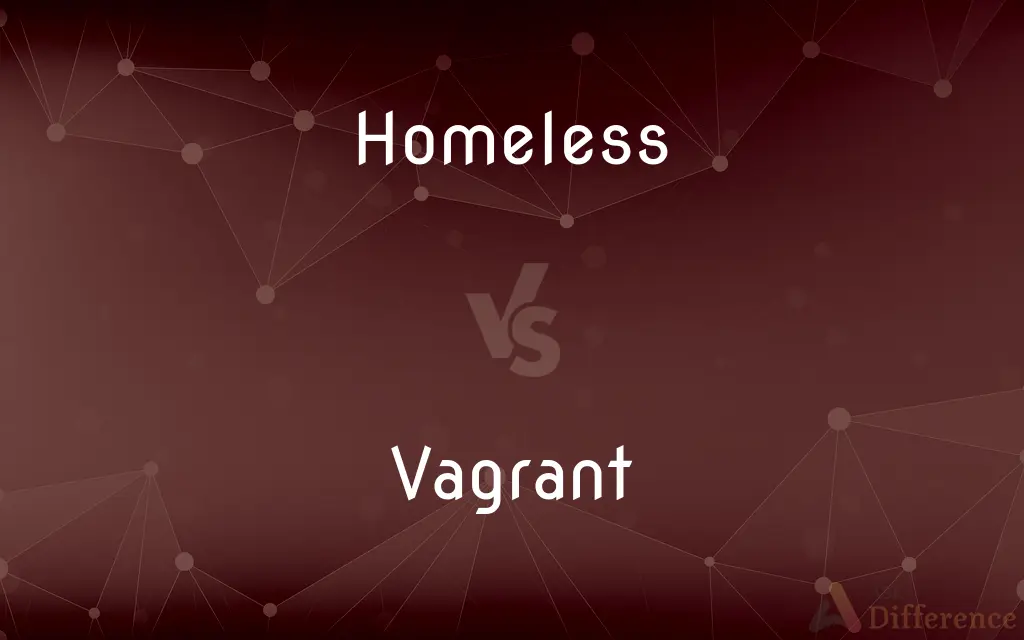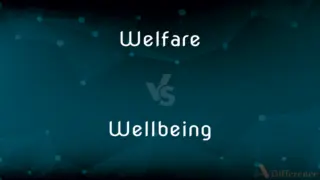Homeless vs. Vagrant — What's the Difference?
By Tayyaba Rehman — Updated on September 19, 2023
"Homeless" refers to a person without a permanent residence. "Vagrant" refers to an itinerant person without a home or regular employment who may also be involved in begging. They are both related but not interchangeable.

Difference Between Homeless and Vagrant
Table of Contents
ADVERTISEMENT
Key Differences
"Homeless" primarily refers to the absence of a fixed, regular, and adequate nighttime residence. In other words, a homeless person lacks permanent housing. "Vagrant," on the other hand, goes beyond the absence of a home to include irregular employment and often an itinerant lifestyle, possibly involving begging.
The term "homeless" is more neutral, focusing specifically on the lack of a home. It does not necessarily imply anything about the person's employment status or lifestyle. "Vagrant," conversely, is often used in a less neutral tone, implying not just a lack of home but also a lack of stable occupation and sometimes even suggesting begging or wandering behavior.
In terms of grammatical usage, "homeless" is primarily an adjective, although it can be used as a noun when referring to the collective group of people without homes ("the homeless"). "Vagrant" is predominantly a noun but can also serve as an adjective describing a lifestyle or characteristics that fit the nomadic, unemployed definition.
While "homeless" has a fairly specific and straightforward definition, the term "vagrant" can be somewhat subjective and its connotations can vary. Legally, the definition of "vagrant" has often included moral judgments or social stigmas, sometimes labeling such individuals as a public nuisance. This is in contrast to the term "homeless," which is more descriptive and less judgmental in legal terms.
Comparison Chart
Part of Speech
Adjective, Noun
Noun, Adjective
ADVERTISEMENT
Meaning
Without permanent residence
Nomadic, without regular job
Connotation
Neutral
Often less neutral
Legal Use
Descriptive, less judgmental
Can be more judgmental
Grammatical Forms
Homelessness, Homelessly
Vagrancy, Vagrant
Compare with Definitions
Homeless
Not having a settled home.
Homeless families often face severe challenges.
Vagrant
Inclined to beg or seek charity.
The vagrant was asking for spare change.
Homeless
Lacking a fixed, regular, and adequate nighttime residence.
Many homeless individuals sleep in shelters.
Vagrant
Nomadic and without regular employment.
The vagrant moved from town to town.
Homeless
Without a permanent domicile.
He became homeless after losing his job.
Vagrant
Having an unsettled or inconsistent lifestyle.
The vagrant lifestyle can be difficult and dangerous.
Homeless
Displaced or unsettled.
The disaster left many people homeless.
Vagrant
A person without a settled home or regular work who wanders from place to place and lives by begging.
Homeless
(of a person) without a home, and therefore typically living on the streets
Charities for the homeless
The plight of young homeless people
Vagrant
Relating to or living the life of a vagrant
Vagrant beggars
Homeless
Having no home or haven.
Vagrant
One who wanders from place to place without a permanent home or a means of livelihood.
Homeless
People without homes considered as a group. Often used with the.
Vagrant
(Archaic) A wanderer; a rover.
Homeless
Lacking a permanent place of residence.
Whenever I pass the park, I see the homeless people sleeping on the benches.
Vagrant
One who lives on the streets or constitutes a public nuisance.
Homeless
Destitute of a home.
Vagrant
An animal occurring beyond its normal range; an accidental.
Homeless
Those people who have no permanent residence, especially those who live outdoors due to poverty; usually used in the definite phrase the homeless.
Vagrant
Wandering from place to place and lacking any means of support.
Homeless
Someone with no housing;
The homeless became a problem in the large cities
Vagrant
Living on the streets or constituting a public nuisance.
Homeless
People who are homeless;
The homeless lived on the city streets
Vagrant
Inconstant or capricious; wayward
"She was resolved to win my vagrant fancy" (Frank Harris).
Homeless
Without nationality or citizenship;
Stateless persons
Vagrant
Moving in a random fashion; having no fixed direction or pattern
Vagrant ice floes.
A vagrant aroma.
Homeless
Physically or spiritually homeless or deprived of security;
Made a living out of shepherding dispossed people from one country to another
Vagrant
Being beyond its normal range; accidental. Used of animals.
Homeless
Being without shelter.
Homeless people may resort to sleeping in public spaces.
Vagrant
(dated) A person who wanders from place to place; a nomad, a wanderer.
Vagrant
(specifically) A person without settled employment or habitation who usually supports himself or herself by begging or some dishonest means; a tramp, a vagabond.
Every morning before work, I see that poor vagrant around the neighbourhood begging for food.
Vagrant
Vagrans egista, a widely distributed Asian butterfly of the family Nymphalidae.
Vagrant
An animal, typically a bird, found outside its species' usual range.
Vagrant
Wandering from place to place, particularly when without any settled employment or habitation.
A vagrant beggar
Vagrant
Of or pertaining to a vagabond or vagrant, or a person fond of wandering.
Vagrant
(figurative) Moving without a certain direction; roving, wandering; also, erratic, unsettled.
Vagrant
Moving without certain direction; wandering; erratic; unsettled.
That beauteous Emma vagrant courses took.
While leading this vagrant and miserable life, Johnson fell in love.
Vagrant
Wandering from place to place without any settled habitation; as, a vagrant beggar.
Vagrant
One who strolls from place to place; one who has no settled habitation; an idle wanderer; a sturdy beggar; an incorrigible rogue; a vagabond.
Vagrants and outlaws shall offend thy view.
Vagrant
A wanderer who has no established residence or visible means of support
Vagrant
Continually changing especially as from one abode or occupation to another;
A drifting double-dealer
The floating population
Vagrant hippies of the sixties
Vagrant
A person who wanders and has no home or job.
A vagrant was found sleeping under the bridge.
Vagrant
Someone who is considered a public nuisance.
The vagrant was arrested for loitering.
Common Curiosities
Is Vagrant a noun or an adjective?
Vagrant is mainly a noun but can also serve as an adjective.
Can Homeless and Vagrant be used interchangeably?
They are related but not interchangeable; "vagrant" often implies more than just a lack of housing.
Is Homeless a noun or an adjective?
Homeless is primarily an adjective but can also be a noun when referring to a collective group.
Does Homeless imply unemployment?
No, being homeless does not necessarily imply unemployment.
Is Homeless a legally defined term?
Yes, "homeless" is legally defined, often for purposes of social services.
Is Vagrant a legally defined term?
Vagrant is sometimes legally defined, often in ways that include moral or social judgments.
What does Homeless mean?
Homeless refers to a person who lacks a fixed, regular, and adequate nighttime residence.
What does Vagrant mean?
Vagrant refers to a nomadic individual without a permanent home or regular employment, often involved in begging.
What is the adjective form of Homeless?
Homeless is itself an adjective; the noun form is "homelessness."
Does Vagrant imply begging?
Often, the term "vagrant" can imply begging or seeking charity.
Can Homeless refer to families?
Yes, families can be described as homeless if they lack stable housing.
Is Homeless a neutral term?
Generally, yes, it's a term that describes a condition without moral or social judgments.
Is Vagrant a neutral term?
Less so; "vagrant" often carries social or moral judgments.
What is the adjective form of Vagrant?
Vagrant is itself an adjective; the noun form is "vagrancy."
Can Vagrant refer to families?
It's less common but possible, especially if the family leads a nomadic and unsettled lifestyle.
Share Your Discovery

Previous Comparison
Welfare vs. Wellbeing
Next Comparison
Paddle vs. SpankingAuthor Spotlight
Written by
Tayyaba RehmanTayyaba Rehman is a distinguished writer, currently serving as a primary contributor to askdifference.com. As a researcher in semantics and etymology, Tayyaba's passion for the complexity of languages and their distinctions has found a perfect home on the platform. Tayyaba delves into the intricacies of language, distinguishing between commonly confused words and phrases, thereby providing clarity for readers worldwide.













































